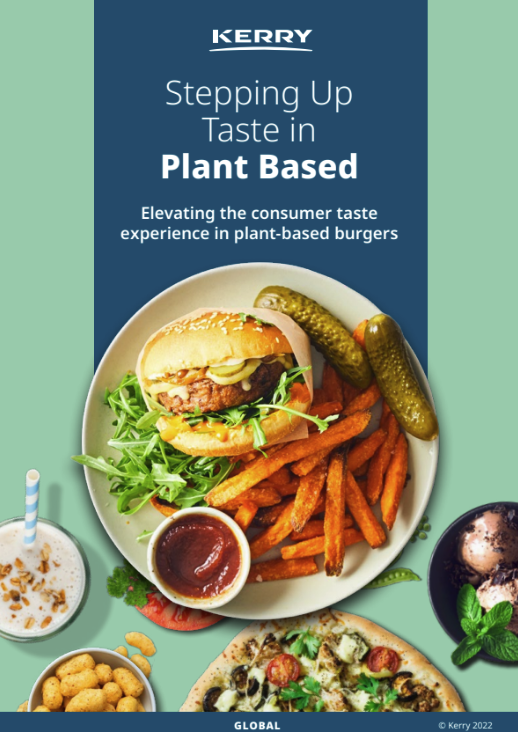Plant-based menu options still going strong, with more new products to come
Over the past several years the plant-based foods category has undergone remarkable growth – and its positioning has shifted from that of a vegetarian/vegan option to a mainstream alternative to animal protein. As Chef Adam Moore puts it, “By the year 2050 we’re going to have nine billion people on the planet, and that really underscores the need to move to more environmentally sustainable food production. I think that is driving a lot of interest in plant-based protein – using science to create a better product and make sure it tastes as good as it presents.”
The primary driver in the widespread take up of plant-based, says Executive Chef David White of Simplot Australia which now offers an extensive range of plant-based proteins under the long-established Edgell brand, is the rise of the ‘flexitarian’ diner seeking to reduce their animal protein intake.
“Referring to plant-based as vegan or vegetarian actually limits the menu appeal of these meal options.”
“What our research has shown is that referring to plant-based as vegan or vegetarian – even though it is obviously suitable for those customers – actually limits the menu appeal of these meal options. Vegans and vegetarians comprise a relatively small percentage of the consumer market, so clearly the growth in plant-based is not coming from there – rather, it’s the meat reducers and flexitarians who are driving this trend.
“We therefore strongly recommend using the term plant-based because it’s an all-encompassing terminology which makes everybody happy. Even McDonald’s are now marketing ‘McPlant’ burgers, and their adoption of the terminology shows how mainstream it’s become.”
Plant-based proteins need to be versatile and easy to use
David says that after the growth spikes of the past two years, the plant-based category is now well and truly bedded in for both retail and foodservice. “In foodservice terms, I think plant-based has become a category you need to offer on the menu, in order to make sure you’re catering for everyone. You might get a table of 10, or a group takeaway or home delivery order, where only two or three people want a plant-based option, but if you don’t have it on offer, you’ll miss out on the entire order - they’ll go to your competitor who has those choices available.”
He argues the key to Simplot’s success in this category has been the recognition of the need to offer plant-based proteins which are both versatile across the menu and easy to use. “Our philosophy is that you shouldn’t have to change your cooking methods or recipes in order to accommodate plant-based ingredients – ideally you want a product that allows you to do a straight swap with the regular protein.
“For example, if you’ve got a favourite recipe for a Thai Green Curry that you’ve been using forever, with our product you can simply replace the chicken with the plant-based protein and not have to change anything else. It cooks the same, it browns the same, it has the same texture and mouthfeel and a comparable flavour profile.”
“While the early adopters of plant-based may have had disappointing experiences, it’s a very different proposition now.”
David also makes the point that when plant-based proteins initially came on the market, “the earlier iterations from some suppliers didn’t have the greatest flavour profiles – but now formulations have really improved, and that has driven uptake. At Simplot we conduct regular reviews and testing of new products on the market, so we can see how rapidly the quality has evolved and is continuing to improve. So while the early adopters of plant-based may have had disappointing experiences, it’s a very different proposition now.”
He acknowledges that the plethora of plant-based products from a wide variety of suppliers can make it difficult for foodservice operators to identify the best choice for their business. “That’s part of the reason we have decided to market our plant-based range under the Edgell brand – it’s a well-recognised brand that’s known for quality, so I think foodservice professionals looking to introduce plant-based on the menu will trust us to give them the quality standard they’re looking for.
“The same has been the case in retail where we sell plant-based under Birds Eye – retail consumers were initially hesitant about the category, but when they see a well-known brand it helps encourage them to try the products. We’re now number two in the retail space for plant-based and that’s with no advertising, simply the strength of the brand and the fact that we deliver a great product. The same philosophy underpins Edgell plant-based products in foodservice – Edgell has a longstanding reputation for quality vegetables, so there’s a strong connection to plant-based there.”
Simplot has recently launched what it believes is the world’s first plant-based lamb, and David emphasises: “We’re seeing growth now due to the different types of proteins you can use within plant-based – such as soy wheat and pea proteins. The more we’re developing the category, the more we’re finding we can achieve different textures with various protein combinations. That is opening the door to a whole range of new products to come – the plant-based lamb we’ve just launched, for example, has that nice slow-cooked texture, similar to the shredded lamb you’d serve in a slider.”
Flexitarians make up about 30 per cent of the market
Unilever’s 2022 ANZ Food Trends Report
Andrew Ballard, Corporate Chef at Unilever Food Solutions, points out Unilever’s 2022 Australia and New Zealand Food Trends Report identifies five mega themes and 29 sub-trends, among them “one-for-one plant-based substitutes”, arguing “even previously difficult to replicate foods, such as egg and fish, are improving significantly.”
“Our research shows flexitarian diners now make up about 30 per cent of the market, so we recommend chefs should be consider quality plant-based ingredients as a highlight of the dish, with animal proteins taking on a more complementary role,” Andrew says.
“Pub, club and café menus have had staples that haven’t changed for decades, but the time has come for chefs to inspire a new generation of diners. It’s a big opportunity – chefs need to cater for diners choosing to eat less meat and more plant-based meals, and menus need to change to incorporate this. Creating unique dishes and getting enough flavour into them is where the exciting challenge lies.”
Unilever Food Solutions has recently expanded the Knorr range with the addition of Knorr Supreme Gravy, which is plant-based and certified vegan as well as ‘clean label’ (meaning no artificial flavours or colours). This allows it to be used across the board for all meal types and all venues. “We’re focusing on supporting chefs with an expanding range fo solutions, supported by recipe ideas that provide the flexibility to meet any plant-based dietary request,” Andrew says.
“Chefs need to think about incorporating these ingredients into their meals, as a means of helping to improve the food system globally.”
Knorr’s Future 50 Foods
He makes the point that not only is plant-based truly mainstream now due to consumers looking to eat less meat, it also ties in to sustainability concerns. “Another report Unilever has recently released is the Knorr Future 50 Foods, in partnership with the World Worldlife Fund, and this is looking at how plant-based foods can improve peoples’ nutritional intake while reducing environmental impact,” Andrew tells us.
“Seventy-five per cent of the world’s food comes from just five plant and animal species, so this is about changing that mindset. Some of the ingredients we’re putting forward, like lentils, wild rice and kale, are highly sustainable – what we’re recommending is that chefs think about incorporating these ingredients into their meals, as a means of helping to improve the food system globally.
“It’s not about our products as such – it’s about using these ingredients to create a more sustainable future, and any chef who has an interest is welcome to download the report and learn more.”
Consumers don’t want to compromise
A Nestlé Professional spokesperson says: “Authentic taste and texture are vital to attracting meat reducers. Consumers want something that authentically mimics the sensory experience of animal proteins. A recent report by sustainable nutrition company Kerry called Stepping Up Taste In Plant Based says 76 per cent of Australians are more willing to buy a plant-based burger described as ‘authentic chargrilled-tasting’.
Stepping up taste in Plant Based
“The report goes on to state that of all markets surveyed Aussies were the most sensitive to bitter beany notes and other unpleasant or overwhelming flavours that come from traditional plant-based protein sources like legumes. One surveyed consumer said, “A plant-based burger should be like beef in colour, flavour, texture - I don’t want to compromise.”
“Operators should prioritise the use of plant-based products that come as close as possible to mimicking the real thing”
Nestlé says that to attract meat reducers foodservice operators should focus on not only offering plant-based menu alternatives but prioritising the use of products that come as close as possible to mimicking the real thing, adding: “Products like the Harvest Gourmet Sensational Burger have proved successful in winning over meat reducers craving authenticity from plant-based dishes. As it’s high-protein and high-fibre, the Sensational Burger ticks multiple boxes for Aussie meat reducers.”









